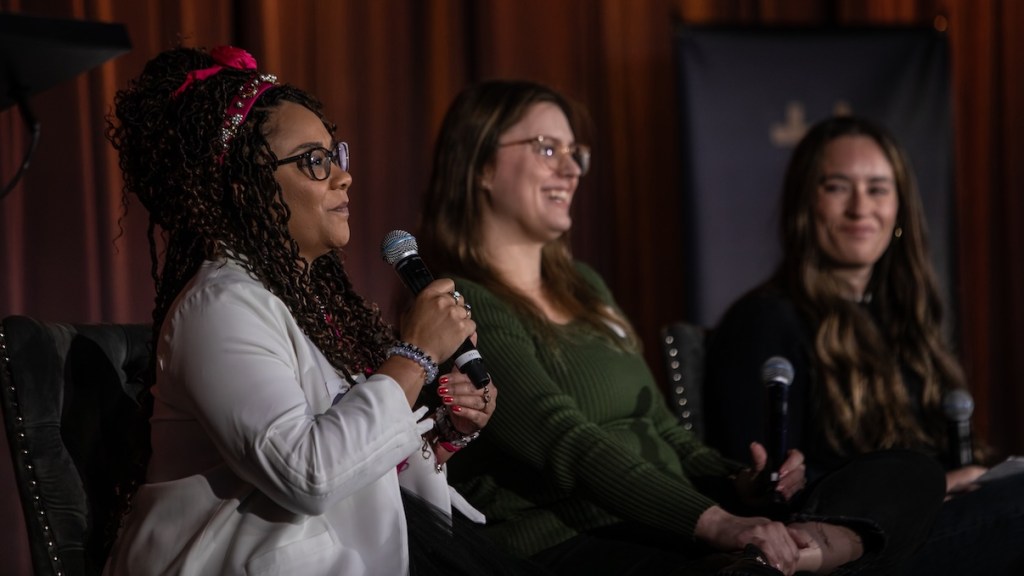Hollywood and games have collided, and collaborations between film, music, television and video games creatives have been multiplying, often to brilliant results. Breaking into this intersection of industries is tricky, even with diversity, inclusion and equity opening doors to new creators and innovators. And that was one of the central themes at this year’s GamesBeat Insider event, “Blurring Boundaries: The Convergence of Film, Music, TV, and Games.”
Amanda Kruse, head of business development at Big Fan and Erika N. Ewing, director at Lionsgate Games sat down with Bridget Stacy, VP global marketing, Xsolla sat down to talk about how the industry is evolving at the crossroads between gaming and entertainment, and how future leaders with diverse perspectives can get their foot in the door now.
“Gaming is inevitably a younger industry than film and TV — it’s a place you have to be entrepreneurial,” Kruse said. “A place where the best people I know who have the jobs they love the most, they made those jobs up for the most part. Film and TV makes you wear a lot of hats.”
But gaming and entertainment are still predominantly male-driven, though more women leaders than ever are emerging at the forefront of the industry. Today there are more voices at the table, more diversity in games and characters, but keeping that trend alive requires marginalized folk to reach out to their peers in supportive ways. Ewing credits her time as part of the Frag Dolls, a group of girl gamers recruited by Ubisoft to promote games and compete in esports, as a critical part of her growth in the gaming industry.
“Being around them, being empowered by them and finding a place, finding other women in the pathway, or people that I admired, a few steps ahead of me,” she explained, was a gateway for her career. “When I take those few steps ahead, you give those few steps back, and always keep that door open. I hope we just keep doing it for each other more and more, and it’s showing at the table.”
Normalizing new perspectives
She and Kruse met when Ewing started at Lionsgate Games, where Kruse was an integral part of her career trajectory. Lionsgate is a studio defined by its female-led and focused entertainment — Orange is the New Black and Power, for example, one of the biggest shows on TV with a female showrunner. They’re also the studio that produced Hunger Games, the highest grossing action franchise with a female lead, Kruse said.
“The inside of the studio is very much like that,” she said. “We had a lot of department heads that were women. We had a lot of voices at the table. It felt normal. The normalization of that definitely gave Erika and I a lot of confidence when it wasn’t the norm, when we would go into other spaces where that wasn’t necessarily the norm.”
How the gaming industry is changing
Film and TV is a little bit ahead in this conversation, Kruse said,
“There are definitely more senior women that I work with, in film and TV than there are in games,” she explained. “But even in the short amount of time I’ve been in games, it’s changed radically. I will say, one thing that’s lovely is just the collaborative nature of games. It’s very hard to get into film and TV when you’re young but in games I had a very different experience. I’ve never been part of a community where I’ve been so able to say, hey, I don’t know what to do. People, especially incredible women in this industry, have leapt forward to provide me resources or get me educated, which has been amazing.”
The critical role of mentorship
“I think both Erika and I take mentorship pretty seriously. It’s something we don’t just foster in ourselves, but we try to foster it in other people,” Krause said. “I don’t think it’s something people take seriously enough. Film and TV is kind of a broken apprentice system.”
To address the ways studio culture has failed those in subordinate roles, they actively mentor junior employees, and encourage them to pass that along, and offer mentorship to others, to raise them up, even when it’s not easy, and even when they make mistakes. They also encourage others to put themselves out there, reach out and introduce yourself to folks in the industry you might admire, who might offer their time and attention – and to be generous with their own time in return.
“Give someone else the time of day. You don’t know what magic can happen after that,” she said. “We just have to be there for each other. That’s the heart of it.”
Source link

